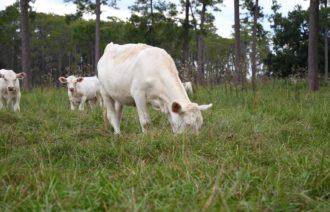Griffin, GA- The Southern Sustainable Agriculture Research and Education program has announced a $1,000,000 Research and Education Grant, the largest awarded since the program launched in 1988.
The National Center for Appropriate Technology, the project lead, selected a systems research approach to identify practical and regionally-appropriate methods of regenerative grazing that can be implemented across the Southeast. Systems research analyzes the problem as a whole by focusing on a broad array of factors rather than on a few isolated variables.
By including the social, economic, political, physical, and biological components of regenerative grazing, the team can identify more effective water management strategies, better ways to sequester carbon and the best methods for improving soil health through regenerative grazing practices.
“Regenerative grazing can be defined a lot of ways, but in our work, we define regenerative grazing as grazing that improves soil health. It’s a simple definition but a good one because it allows us to develop practical, affordable methods of grazing that work on a large scale or a small one,” said Mike Morris, the principal investigator on the project and a Regional Director for the National Center for Appropriate Technology.
Funded through the Southern SARE program, an interdisciplinary team of six universities, three NGOs, and eight farmer cooperators hope to take an already successful grant project from Texas and expand it into Arkansas, Mississippi and Virginia. Over the last five years, this project found success in Texas by creating new tools and building a network of ranches to conduct on-farm research. The results of this project have been shared across Texas and successfully implemented in New Mexico, Colorado and California.
A critical component of the project will be accelerating the adoption of these methods in the Southeast.
“While there’s a lot of excitement and success stories from around the country about regenerative grazing these days, adoption rates in the Southeast are still low—around 10 to 20% according to published studies. Increasing those adoption rates is an ideal topic for systems research because the barriers are so numerous and diverse. They are economic and social as well as scientific. The questions people have about regenerative grazing haven’t been fully answered by controlled studies. We’ve seen that a peer-to-peer network approach can go a long way in helping address those limiting factors by increasing communication among those involved,” said Morris.
Set to be completed in 2024, this grant will launch a multi-state network of landowners conducting on-farm trials. Through this peer-to-peer network, participants will be able to share their ideas, failures and successes in regenerative grazing.
Producers will be included in all aspects of the project’s planning and execution. By focusing on small to mid-sized family-owned farms and ranches, the project will prioritize underserved and socially disadvantaged producers.
Eric Bendfeldt from the Virginia Cooperative Extension Service, Dirk Phillip with the University of Arkansas and Rocky Lemus from Mississippi State University will serve as co-investigators on the grant project. Other partners on the grant include Understanding Ag, LLC; Holistic Management International; JG Research and Evaluation; the Virginia Association for Biological Farming; and Virginia Tech.
Published by the Southern Region of the Sustainable Agriculture Research and Education (SARE) program. Funded by the USDA National Institute of Food and Agriculture (NIFA), Southern SARE operates under cooperative agreements with the University of Georgia, Fort Valley State University, and the Kerr Center for Sustainable Agriculture to offer competitive grants to advance sustainable agriculture in America’s Southern region. This material is based upon work that is supported by the National Institute of Food and Agriculture, U.S. Department of Agriculture, through Southern Sustainable Agriculture Research and Education, under sub-award number: LS21-345 USDA is an equal opportunity employer and service provider. Any opinions, findings, conclusions, or recommendations expressed in this publication are those of the author(s) and do not necessarily reflect the view of the U.S. Department of Agriculture.
View Related SARE Grant:
- Soil for Water (LS21-345)
